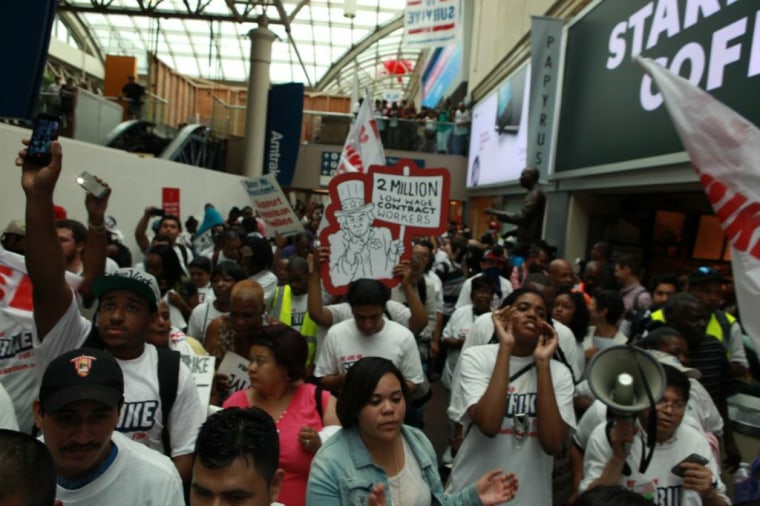Hundreds of low-wage employees of federal contractors walked off the job on Tuesday morning, demanding that President Obama sign legislation or an executive order requiring federal contractors to pay higher wages. The Washington, D.C., strike is led by a new campaign called Good Jobs Nation, formed earlier this month.
On the same day that the Good Jobs Nation campaign was officially launched, Demos published a report finding that federal contracts directly subsidize over half a million low-wage jobs, defined as jobs which pay below $12 per hour. Once Medicare spending, infrastructure funds, and similar programs were included, the federal government was found to subsidize nearly 2 million such jobs.
"I can't even afford to get an apartment or raise my daughter properly because of the money that I'm making," said Jonathan Ross, one of the D.C. strikers. Ross works at the Constitution Café, a privately managed restaurant in the Smithsonian Institute's American History Museum. He told msnbc that after four years of being employed at the restaurant, he still makes only $9.71 an hour.
"For the four years I've been here, I've had a 10-cent raise, a 15-cent raise, and another 10-cent raise," he said. While he doesn't receive federal assistance in the form of food stamps or subsidized housing, he said he struggles to provide for his 15-year-old daughter, over whom he has sole custody.
To lift up their wages, Ross and his fellow strikers are asking that Congress and President Obama impose new requirements on federal contractors. One proposal for action comes from the Demos report, which suggests "[a]n executive order requiring federal agencies to take all possible steps to raise workplace standards and ensure that companies comply with applicable labor and employment laws."
According to the report, the largest number of federally subsidized low-wage jobs are concentrated in the health care industry: Government funds support nearly 800,000 low-wage jobs in hospitals and nursing homes, and close to 400,000 such jobs in home health care. Construction is next up with over 80,000 federally supported low-wage workers, and retail accounts for 60,000 low-wage, federally funded jobs.
A release from Good Jobs Now claimed support for their campaign from House Progressive Caucus co-chairs Raul Grijalva, D-Ariz., and Keith Ellison, D-Minn. The two are expected to hold an "ad hoc hearing to investigate the federal government's role in promoting low-wage jobs" Tuesday afternoon along with fellow House Democrat members Eleanor Holmes Norton of D.C. and minority whip Steny Hoyer of Maryland.
The federal contractor strike follows in the wake of several high-profile and historically anomalous labor actions within the low-wage fast food and retail industries. Well over 1,000 fast food workers across the country have struck in the past few months, most recently in Milwaukee.
"I read these stories, I'm like damn, this sounds like me," said Ross of the fast food strikes. "They're in the same predicament that I'm in. There are people outside standing up, so I'm thinking if they're standing up, why can't I?"
